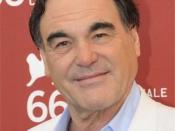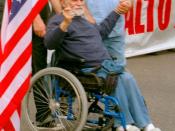What makes a Vietnam veteran different than any other? Why was Ron Kovic's return so much more agonizing than Homer Parrish's in The Best Years of Our Lives? Vietnam was not the "good war" that WWII was. Many Americans believed it was a war that should have never been fought, and the veterans became scapegoats.
Many of the American men who went to Vietnam thought they were saviors and guardians of freedom (15). They had grown up with JFK speeches, John Wayne movies, Cold-War anti-communism. They had faith in their elders and American myths and the order of things (15). The war seemed a good thing--so much so that two-thirds of the men who served were volunteers (as opposed to only one third of the WWII service) (18). Many of those who volunteered did so because they regarded the draft as inevitable. Yet those who volunteered saw serving their country as a duty at the very least, and many went to fight communism: the threat to all that our nation was founded upon.
Their experience in Vietnam jolted these notions. They were perceived as intruders and murderers, not heroes (15). They witnessed the corruption and cruelty of their superiors and saw arbitrary killing and torture. And despite the myths, fighting in Vietnam was intense. The average infantryman saw about 240 days of combat per year, as opposed to 40 days per 4 years in the South Pacific during WWII (18). Amputations and crippling wounds were 300% more common than in WWII (18). And for what? Vietnam veterans against the war swear they saw nothing in South Vietnam that threatened the USA (10). How could they not have questioned their role in Vietnam? They were disillusioned, and it was worse for those who had believed in the war to begin with (15).
But the horror didn't stop when they left the front. The Cold War gung-ho attitude of Amerians had changed. The death, risk, and bravery of the soldiers was rendered meaningless because Vietnam was a "bad war" (15). As one returning vet said, "I didn't expect a hero's welcome. However I did expect a certain amount of respect for serving my country, especially from those who...didn't have to serve." (16) The veterans suffered isolation and humiliation, made even worse for those who had been honored by the government. How could they consider themselves America's best men, they asked, when they were ashamed of and hated for what they were called on to do? (10) The veterans often felt angry and betrayed. They felt used by the administration of the country (10). They were angered at the win-at-all-costs mentality that had sent them over there, and they felt that it was hypocritical to justify the loss of one American life with the perservation of a freedom they felt to be unthreatened (10).
It's small wonder that the after-effects of this war were so bitter. In the five years after the war, the suicide rate among Vietnam veterans was 1.7 times higher than among non-Vietnam veterans (19). A higher percentage of vets left the war with psychological disturbances than from any other conflict (15). But the country was not there to support these men. Disinterest, or worse, blame and anger, was directed at the vets. For support they had only each other. They found a healing camaraderie in each others' company (15). Organizations for Vietnam vets, some anti-war and some not, provided needed support. Many vets felt the war was necessary and just (15) and wanted respect for their service. Others, like Ron Kovic, grew to hate the war and their role in it and turned to protest.
No matter their course of action, the vets were searching for security, yearning for something to believe in (15). Like the voice of "Born in the USA," they were looking for a home in their country.
Oliver Stone knew this; he had been there. Kovic's story was partly his story. Though Stone had never been an activist, he too had experienced the disinterest of his fellow Americans. He had questioned the authority he had once believed in. He had come to many of the same conclusions that Kovic did, that many veterans did. And Stone knew that the veteran's story was a story that needed to be told.





